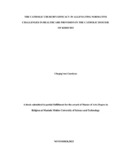THE CATHOLIC CHURCH'S EFFICACY IN ALLEVIATING NORMATIVE CHALLENGES IN HEALTHCARE PROVISION IN THE CATHOLIC DIOCESE OF KERICHO
Abstract
A comprehensive goal of the United Nations' Sustainable Development Goals of 2015 was to ensure healthy lives and promote wellbeing for all ages. The divide between the haves and the have-nots is, however, rapidly expanding as the global society changes, notably in terms of access to healthcare services. In addition, the Catholic Church as a social institution has a social and moral obligation to participate in the provision of healthcare. The main problem of this study therefore, was to examine whether the catholic church’s teachings and obligation on healthcare have an impact on its provision of healthcare in the Catholic Diocese of Kericho. The specific objectives that guided the study were: First, to evaluate healthcare provision as a contemporary phenomenon and explore the normative challenges related to it in general. Second, to examine the Catholic Church’s position on healthcare provision in general. Third, to examine the success of the catholic church in alleviating normative challenges in healthcare provision in the Catholic Diocese of Kericho. The liberation theology theory, which relies on the synthesis of Christian teachings and socioeconomic analysis that promotes social concern for the poor and freedom for the oppressed people served as the study's interpretational lens. In so doing, the theory guided this study in exploring the relationships between Catholic church Christian positions with particular regard to economic justice, poverty and healthcare provision human rights. Additionally, the research design used in the study was descriptive. The respondents for the study were chosen using simple, purposive, and snowballing samplings. In this study, both primary and secondary data were used. While secondary data was gathered by conducting a critical study of pertinent secondary sources such as books, journals, and magazines, primary data was gathered via questionnaires, interview schedules and focus group discussions. Utilizing frequency distribution tables and percentages, the quantitative data was presented in a descriptive manner with the goal of illuminating the study's response pattern. Qualitative data collected was analyzed thematically by describing the findings of each objective. Ethical considerations such as seeking permission from relevant authorities, maintenance of utmost confidentiality and seeking respondents’ consent were built to safeguard the respondents. From the study, it was clear that Catholic Church teachings and obligation has great influence in healthcare provision. However, findings in support of the study revealed that challenges bound to socio-economic attributes are still witnessed in the accessibility and the practice was bound to affordability, healthcare technology divide and geographical location among others. In this way, it could be argued that the catholic church has not been adequately effective in alleviating normative challenges in healthcare provision in the Catholic Diocese of Kericho. The study therefore recommends the Catholic Church to have a dialogic posture with the world from perspective of the poor if indeed it must play a bigger role in redefining human dignity, defending human dignity and liberating people from oppression of human values related challenges in healthcare provision in a more functional way.

